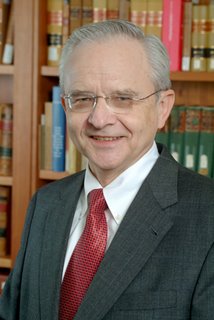 I've just finished reading an extraordinary article in the October 15, 2006 issue of The Remnant Newspaper. Raymond B. Marcin, Professor of Law at the Catholic University of America, proposes a radical thesis. He argues that a great moral flaw in Vatican II contains within it "an implication that the participants in the Second Vatican Council could not have been cooperating with the oversight of God the Holy Spirit."
I've just finished reading an extraordinary article in the October 15, 2006 issue of The Remnant Newspaper. Raymond B. Marcin, Professor of Law at the Catholic University of America, proposes a radical thesis. He argues that a great moral flaw in Vatican II contains within it "an implication that the participants in the Second Vatican Council could not have been cooperating with the oversight of God the Holy Spirit."Can a Council of the Church be defective? Professor Marcin quotes Cardinal Ratzinger (now Pope Benedict XVI):
...[n]ot every valid council in the history of the church has been a fruitful one; in the last analysis many of them have been just a waste of time.Archbishop Chaput of Denver made similar comments in December 2005:
...the last word about the historical value of Vatican Council II has yet to be spoken.
While all true ecumenical councils are important in the life of the Church, some failed to achieve their goals. The Council of Florence failed in the 15th century because the Western Church was badly divided and the Greek Church could not accept a union. The Fifth Lateran Council (1512-1517) failed in the 16th century because it focused on the wrong issues. It did too little too late to change the conditions that led to the Protestant Reformation.Professor Marcin goes further and points out that all of the Bishops who participated in Vatican II adopted measures inconsistent with the Oath Against Modernism--which they had all subscribed to when they were ordained. This solemn oath was supported by many prior Papal documents, and was not rescinded by the Vatican until 1967, two years after Vatican II concluded.
Professor Marcin identifies remarks of Cardinal Ratzinger, where he explains documents of Vatican II were a revision of earlier Papal documents.
If it is desirable to offer a diagnosis of the text [of Gaudium et Spes] as a whole, we might say that (in conjunction with the texts on religious liberty and world religions), it is a revision of the Syllabus of Pius IX, a kind of countersyllabus.Professor Marcin notes that Cardinal Ratzinger suggested that Vatican II documents "were intended to 'correct' what he called the the one-sidedness of the anti-modernist position adopted by the Church under Pope blessed Pius IX and Pope Saint Pius X, the Popes whose Syllabi of Errors and Encyclicals warned agains the dangers of Modernism."
The article by Professor Marcin should be read by every serious student of Vatican II.









No comments:
Post a Comment